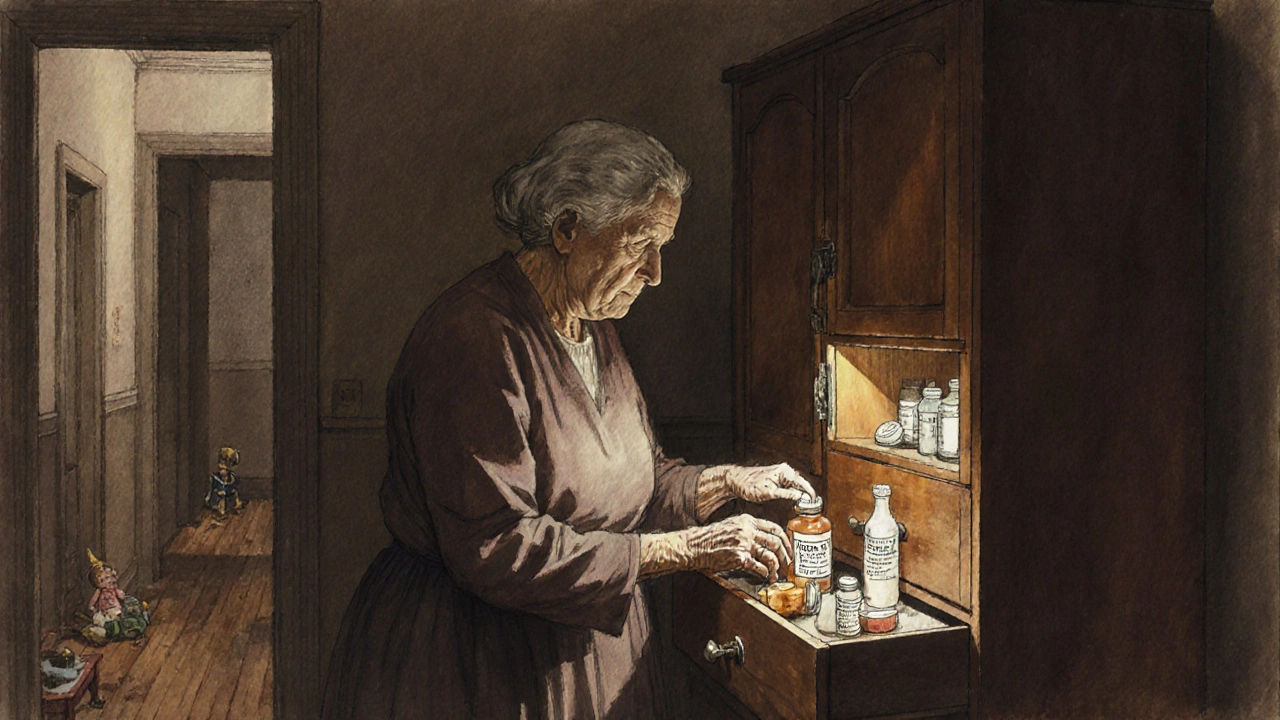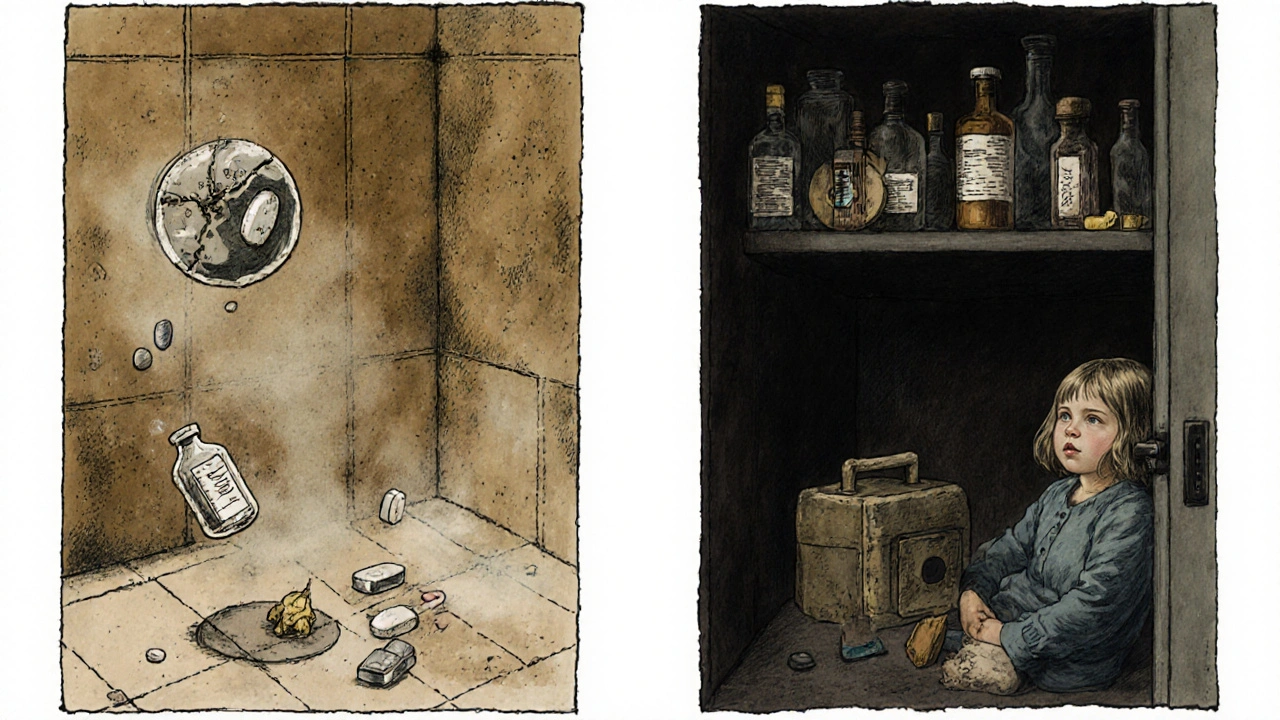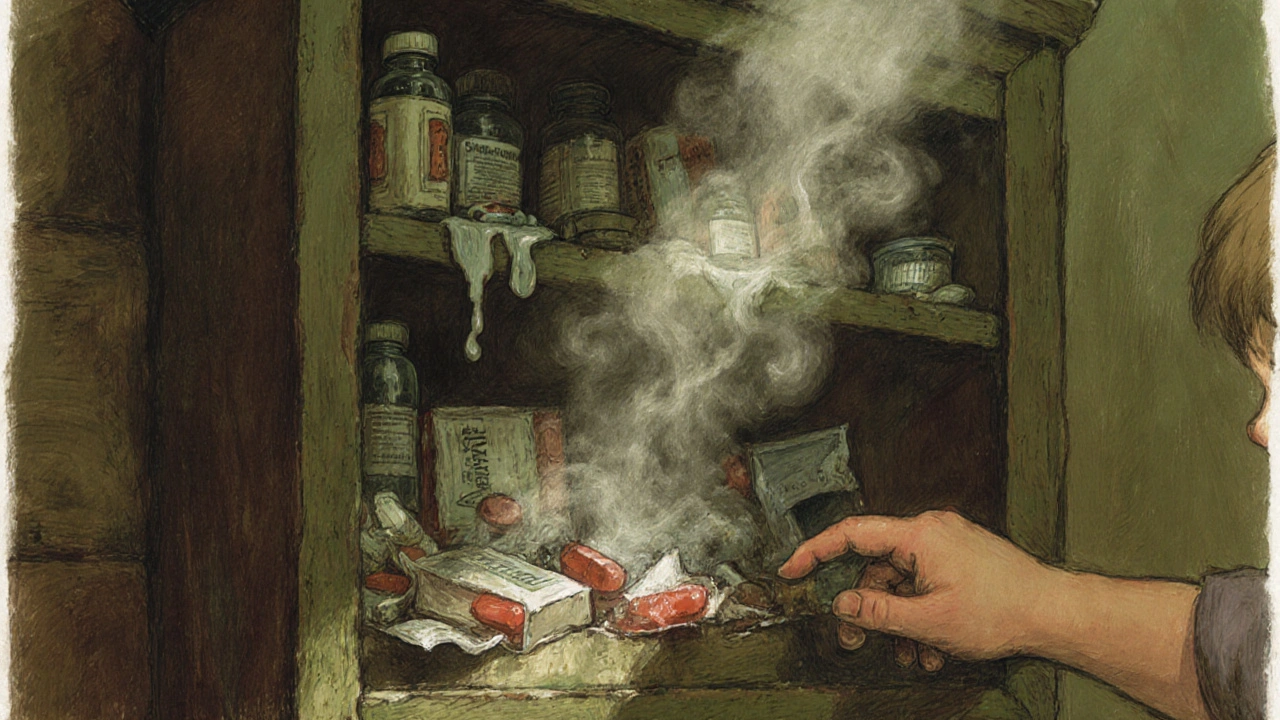Most people keep their medications in the bathroom. It’s convenient. The medicine cabinet is right there, next to the toothbrush and soap. But here’s the truth: storing medications in the bathroom is one of the most common-and dangerous-mistakes people make with their prescriptions.
It’s not just about expiration dates. It’s about what’s happening to your pills, capsules, and liquids while they sit in that steamy, humid space. Heat, moisture, and temperature swings are silently breaking down the active ingredients in your medicine. And when that happens, your treatment doesn’t work like it should.
How Bathroom Conditions Destroy Medication Effectiveness
Bathrooms are not designed for medicine storage. They’re designed for showers, sinks, and towels. That means they get hot, wet, and messy-exactly what drugs hate.
Most medications are stable between 59°F and 77°F (15°C-25°C). A bathroom, especially during or after a hot shower, can spike to 90°F or higher. Humidity levels often hit 80-100%. That’s not just uncomfortable-it’s destructive.
Tablets absorb moisture and start to break down chemically. This process, called hydrolysis, can reduce the strength of your medicine by half or more. Capsules become sticky or brittle. Liquid medications can separate or grow bacteria. Insulin, which is a protein, loses its effectiveness if it gets too warm. Nitroglycerin, used for heart conditions, can become useless in just a few weeks if exposed to humidity.
One study in Circulation found that patients who stored their beta-blockers in the bathroom had inconsistent blood pressure control 30.2% of the time. That’s not a small risk. That’s a life-threatening one.
Birth Control, Antibiotics, and Test Strips: What Else Gets Ruined?
It’s not just heart or blood pressure meds. Almost everything you keep in that cabinet is at risk.
Birth control pills are especially vulnerable. FDA testing shows humidity can reduce their hormone potency by up to 35%. That means you’re not getting the protection you paid for. If you’re relying on them to prevent pregnancy, this isn’t just inconvenient-it’s dangerous.
Antibiotics are another big concern. If they lose potency, they won’t fully kill the infection. Instead, they leave behind the strongest bacteria. That’s how antibiotic resistance starts. The World Health Organization calls this one of the top global health threats. And it’s happening in your medicine cabinet.
Even blood glucose test strips-used by millions with diabetes-are affected. A 2021 study showed that when stored in humid bathrooms, these strips gave wrong readings in 68% of cases. That’s not a typo. Nearly seven out of ten people using them got inaccurate results, leading to dangerous decisions about insulin or diet.
Children, Pets, and the Risk of Accidental Poisoning
It’s not just about the medicine going bad. It’s about who can reach it.
Medicine cabinets in bathrooms are rarely locked. That means kids, teens, and even pets can get into them. The CDC says 70% of misused prescription opioids come from home medicine cabinets. And it’s not just opioids. Painkillers, sedatives, ADHD meds-any of them can be deadly in small doses to a child.
A 2022 NIH study found that 80% of U.S. households store medications in easily accessible places like the bathroom. Of those, 63% had children living there, and 57% had pets. The American Academy of Pediatrics says all medications should be locked away. Yet most people don’t do it.
And if a child swallows even one pill from a degraded bottle? That’s an emergency room visit. A 2023 report from Great Ormond Street Hospital in London found that 4.3% of pediatric medication errors were tied to degraded or mislabeled drugs found in bathroom cabinets.

Where You Should Store Medications Instead
So where should you keep them?
Look for a cool, dry place away from sunlight and heat. That means no window sills, no cars, no kitchen counters near the stove. Instead, pick an interior closet, a bedroom drawer, or a high shelf in a hallway cabinet.
Keep them in their original bottles. Those caps are child-resistant for a reason. Don’t dump pills into random containers unless you’re using a proper pill organizer with tight seals.
If your medication needs refrigeration-like some insulin, eye drops, or antibiotics-keep it in the fridge, but not in the door. The door swings open and closed, causing temperature swings. Store it on a middle shelf where it’s more stable. And make sure it’s in a sealed container so it doesn’t absorb fridge odors.
For most people, the best spot is a locked box in a bedroom or home office. It’s out of reach of kids, away from moisture, and easy to remember.
What Happens to Expired or Unused Medications?
Storing meds in the bathroom isn’t the only problem. Keeping them too long is another.
Many people hold onto old prescriptions “just in case.” But expired drugs don’t just lose strength-they can become unsafe. The FDA says most medications are safe to use past their expiration date, but that doesn’t mean they’re still effective. And some, like tetracycline antibiotics, can actually become toxic.
Don’t flush them. Don’t throw them in the trash. Don’t pour them down the sink. These methods pollute waterways and harm wildlife. The U.S. Environmental Protection Agency says 46% of pharmaceuticals found in rivers and lakes come from improper disposal.
Use a drug take-back program. Many pharmacies, hospitals, and police stations offer free drop-off bins. If there’s no program nearby, mix pills with coffee grounds or cat litter, seal them in a container, and throw them in the trash. That makes them unappealing and harder to misuse.

Why Do People Still Store Meds in the Bathroom?
It’s habit. For decades, bathrooms had medicine cabinets because they were the only built-in storage in most homes. That tradition stuck-even though modern homes have closets, pantries, and drawers.
Even now, 68% of Americans still keep meds in the bathroom, according to a 2023 survey by First Databank. And 89% of them know it’s not ideal. That’s a huge gap between knowing and doing.
Pharmaceutical companies are trying to fix it. Most prescription bottles now include storage instructions. Some even have humidity-indicating stickers or temperature-sensitive labels that change color if exposed to heat or moisture. Smart medicine cabinets with phone alerts are starting to appear. But none of that helps if you don’t move the meds out of the bathroom.
What You Can Do Today
You don’t need to overhaul your whole life. Just make one change:
- Check every medication you keep in the bathroom.
- Move them to a cool, dry place-like a locked drawer in your bedroom.
- Check expiration dates. Toss anything old or discolored.
- Use a drug take-back program to dispose of unused pills safely.
- Set a reminder on your phone to check your meds every six months.
If you’re helping an older parent or someone with chronic illness, help them do this too. Their health depends on it.
Medications save lives. But only if they work as they should. Storing them in the bathroom isn’t harmless-it’s a hidden risk. And fixing it takes less than ten minutes.
Can I store my medications in the kitchen?
Only if it’s away from the stove, oven, or sink. Kitchens often have high heat and humidity from cooking and dishwashing. A cabinet far from the stove, like in a pantry, is better than the bathroom-but still not ideal. A bedroom drawer is safer.
What if my medication says to refrigerate it?
Keep it in the fridge, but not in the door. The door gets warm every time you open it. Store it on a middle shelf where the temperature stays steady between 36°F and 46°F (2°C-8°C). Use a sealed container to prevent odor absorption.
Is it okay to keep pills in a pill organizer?
Yes, but only for short-term use-like a week or two. Pill organizers don’t protect against moisture or light. Don’t leave them in the bathroom, on the windowsill, or in your car. Store the main supply in a cool, dry place and only fill the organizer as needed.
How do I know if my medication has gone bad?
Look for changes: tablets that crumble, change color, or smell odd; capsules that are sticky or swollen; liquids that are cloudy or have particles. If you’re unsure, don’t take it. Talk to your pharmacist. They can test or replace it.
What if I live in a small apartment with no extra storage?
Even in small spaces, you can find a safe spot. Use a locked box or small container and keep it on a high shelf in a closet, under the sink (if dry), or even inside a drawer in your nightstand. The key is to avoid heat, moisture, and access by children or pets.


Write a comment